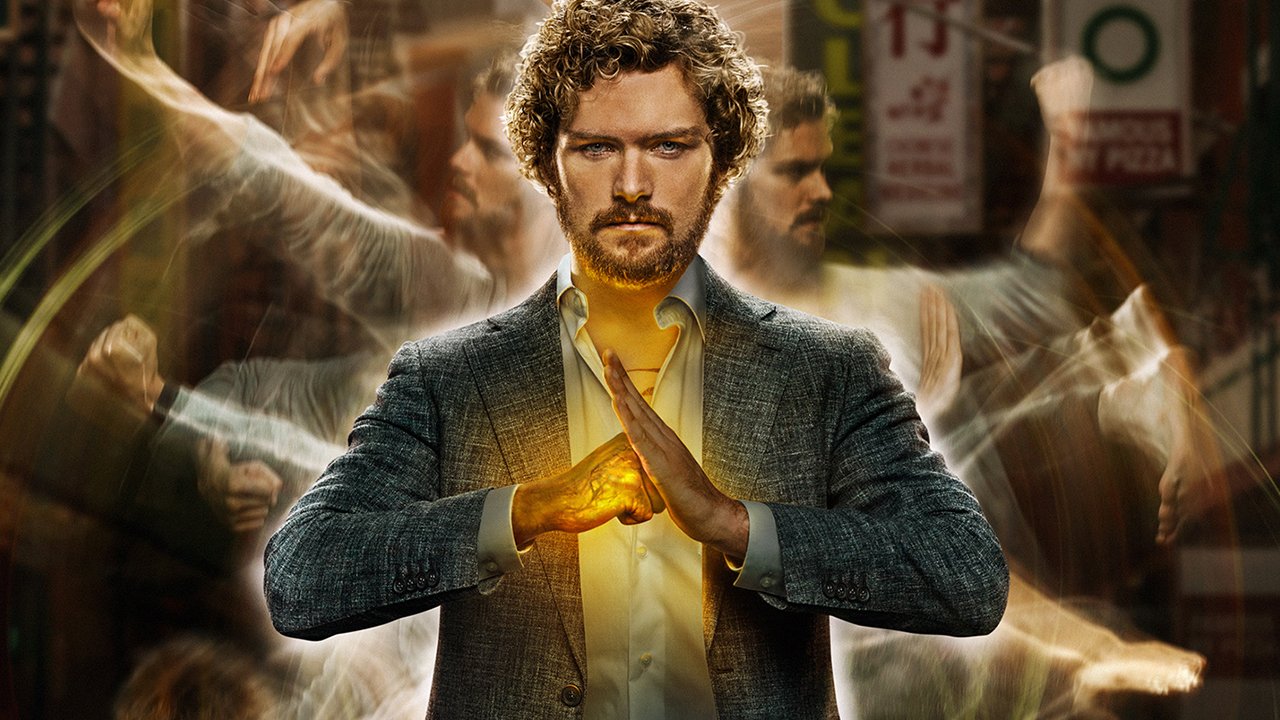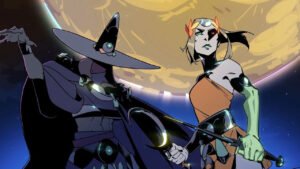Editor’s Note: This preview covers episodes one to six of Marvel’s Iron Fist.
Let me answer the two questions on everybody’s lips: 1) Marvel found a way to make Iron Fist compelling without just ripping off Batman Begins and 2) yes, there’s an undercurrent of the “white savior” trope at first, but the first six episodes have laid the groundwork for a subversion I expect we’ll see towards the end of the season. If that’s all you need for a recommendation, then you’ll likely enjoy the first six episodes of Iron Fist to some degree. It also helps that Iron Fist eschews some of Marvel Netflix’s worst tendencies, like dedicating a large amount of screen time to side characters who are constantly two steps behind and have little bearing on the show’s forward momentum (cough Luke Cage cough Season 2 of Daredevil cough).
Iron Fist follows Danny Rand (Finn Jones), the titular hero, who has returned to Western civilization after 15 years of training in an ethereal pocket dimension city called K’un-Lun. During that time, he was presumed dead, which makes it hard for Rand to prove his identity and reclaim his family’s company, Rand Enterprises. His childhood friends Joy and Ward Meachum (Jessica Stroup and Tom Pelphrey, respectively) have been placed in charge in his absence. Though Joy might be a little more willing to believe that Rand has come back from the dead, Ward has his own reasons to keep Rand down.
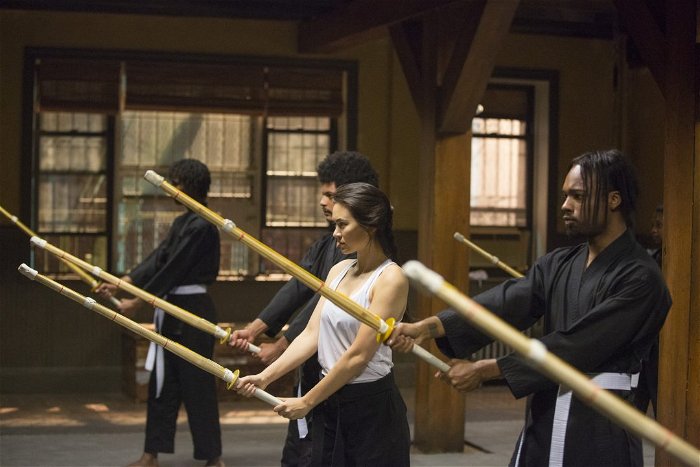
There’s a lot more corporate intrigue than you might expect from a superhero TV show, especially during the first handful of episodes as Danny starts to prove he’s really who he says he is. Most of the action takes place around Rand Enterprises, but that’s not a bad thing — the show does a solid job of fleshing out its core characters before introducing the nefarious Hand ninjas, who are behind the whole mystery plot in order to set themselves up as the villains of the Defenders miniseries.
Of particular note is Joy Meachum, a character who has spent most of her adult life as an amoral businesswoman, only to be rocketed back to her childhood by a long-lost chum. It’s a great way to have Joy split the difference between protagonist and antagonist, resulting in a character viewers could like or dislike in equal measure. Stroup’s performance is never too cold or too naive, and often left me second-guessing her motivations. That is, until her brother’s drug problem is introduced, and then her narrative has to be about that.
Here’s the problem: outside of the character building, the Rand Enterprises stuff is boring as hell when stacked against the kung-fu of Iron Fist. I understand that Danny Rand is a billionaire in addition to being a crime-fighter, and that’s a fun idea that literally nobody has ever done before (heavy sarcasm), but the corporation’s secret connection to the Hand is little more than blackmail, at least at first. That’s not a very exciting concept for a TV show about a guy with a magic fist. We’ll have to see if the Hand operatives working inside Rand Enterprises start getting more brazen.
If there’s an x-factor in both this whole corporate espionage business and the show itself, it’s Colleen Wing (Jessica Henwick): the owner of a local dojo where Danny Rand hangs out during his homeless phase. She’s a rival to the Iron Fist, almost his equal in martial arts skill; a sort of mentor figure as Rand starts to re-introduce himself into society; a potential love interest; and, once the crime-fighting starts, a badass partner. That’s a lot for one character to go through over six hours, and Henwick sells this alchemic mix with aplomb. I believed her performance absolutely, even when it didn’t quite feel like the show earned her sexual tension with Rand.
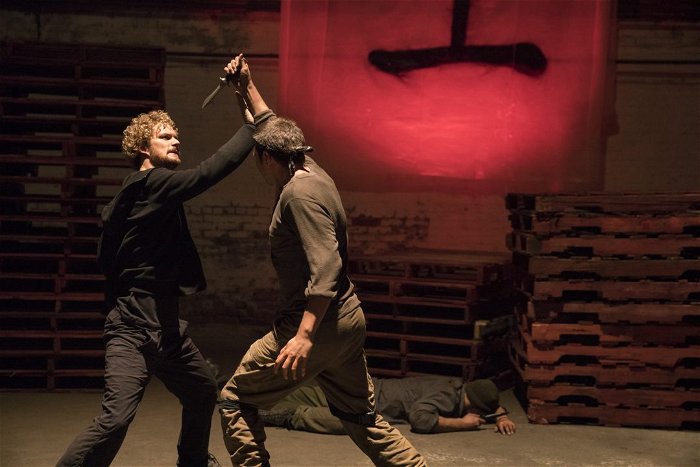
For the most part, Wing gets the best action scenes, like a violent cage match against two different guys at once. When Danny Rand starts fighting, it’s less interesting aside from the (surprisingly well-lit) Marvel Netflix hallway fight. His scenes don’t have the same kinetic energy, instead coming off like a Power Rangers fight at times. Conversely, Wing’s blows are given the kind of weight you saw in some of the earlier Daredevil stuff.
This all changes in episode six, where RZA is given the director’s chair. Episode six follows Iron Fist as he engages in a sort of Trial of the Dragon with colourful assassins hired by the Hand. Not only is the fighting much better, with the sort of impact and energy you originally expected from a Marvel Netflix show, but it also ties into Rand’s development as a superhero and starts planting the seeds that Rand might not be the kung-fu master we assumed.
Those seeds are taking root in the garden of, uh, Finn Jones’ performance as Danny Rand. (Metaphors are hard!) Jones plays Rand as a young man who never got to properly develop, instead spending his formative years with an abusive sect of warrior monks. He’s almost childlike and naive, but there’s a simmering rage that stems from his non-compartmentalized grief over the death of his parents.
A good portion of Rand’s origin remains the same — he was with his parents when they died, he was taken in by K’un-Lun monks, he got super good at kung-fu and became the Iron Fist —but it’s heavily implied that Rand didn’t exactly finish his training at K’un-Lun, or leave on the best of terms. He’s not the best there ever was at this particular Asian-coded culture, he’s kind of an idealistic screw up with unresolved daddy issues. Rand is back in the Big Apple to save his own company and protect people, not save people from themselves. Of course, there’s plenty of time for all this to fall apart in the next seven episodes (cough Luke Cage again cough), so assume the worst until you hear the best.
After the relentlessly grim Daredevil and the ponderous second half of Luke Cage, I was pleasantly surprised to see people making jokes in Iron Fist. The main character seems happy to be there for once, and hell, most of the rooms are even fully lit! This does have the unfortunate side effect of robbing Iron Fist of any potential aesthetic — where Daredevil felt like a grim crime story, Jessica Jones like a neo-noir, and Luke Cage like a classic blacksploitation flick, Iron Fist just feels like a regular television show. There’s no thematic undercurrent, no particular stylistic flair to grab onto.
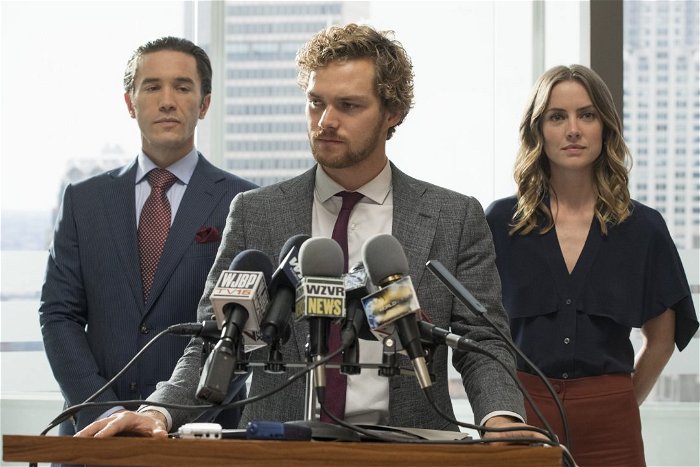
Iron Fist is a little too serialized at first, as per usual for streaming services, but at least the plot and character motivations remain consistent. I don’t mean to keep harping on the failures of previous Marvel Netflix shows, but the overarching threat is the same, and characters are making choices according to previously established desires. Most of the protagonists are proactive, working against reactive antagonists — this keeps the story moving, aside from a gaslight-heavy detour in a mental hospital that really could’ve been condensed into a single episode.
Without a look at the full season, it’s hard to guess where Iron Fist stacks up; both on its own terms and with regards to the other Marvel Netflix shows. There’s certainly more good than bad, but Iron Fist’s workmanlike aesthetic means it’ll likely succeed or fail exclusively on the strength of its writing. Right now, all we’ve got is an incomplete story with a lot of promising hooks.
